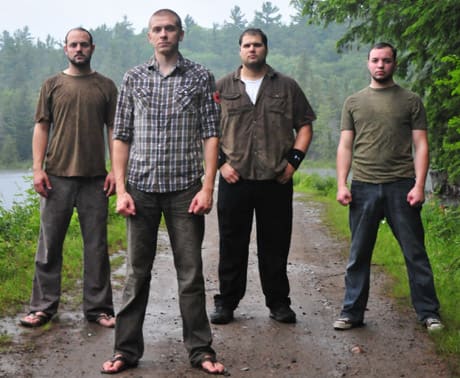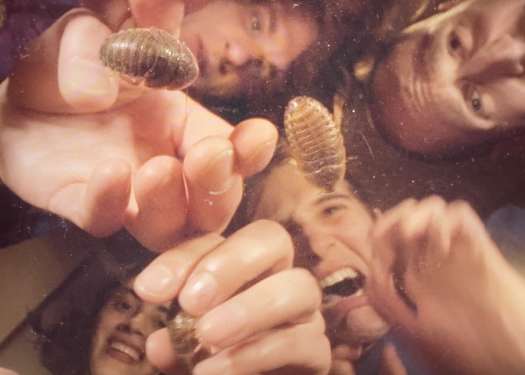With each record, Ontario's Woods of Ypres become more enigmatic, and Woods 4: The Green Album is the band's most amorphous and powerful creature so far. Over 16 tracks and nearly 80 minutes of music and story, Woods 4 covers almost more emotional and temporal ground than reasonably fits into a single album. At the core lies a sludgy welding of death and doom but the songs radiate out from there, drawing on alt-rock, goth, thrash, folk and prog. Keyboards have been stripped mostly away, sharing or trading off the quieter moments with acoustic guitar, cello and oboe. The heaviest sections emerge from the record's fusion of emotion and texture, the tight interweaving of hybrid threads under a raw, jagged surface and an old school vibe. If there's polish, it's not in the harsh tones or production but in the songwriting and performance, especially the vocals ― from the wealth of clean melodies to contrasting visceral growls. The shifts shape and support The Green Album's emotional atmosphere: dark, depressing and honest, but not completely willing to take itself seriously. This mix of honesty and irony, climaxing in the epic "I Was Buried in Mount Pleasant Cemetery," is the album's strongest appeal, a compelling record of where the band have been and a marker of where they might go next.
What makes Woods 4 the "Green Album"?
Guitarist/vocalist David Gold: 1) The Green album has a dark, lush, organic doom sound. 2) We made effective use of our limited time and resources to write and record it as productively and efficiently as possible. 3) We have the rhythm section from Philadelphia psychedelic black metal band the Green Evening Requiem (Evan Madden drums, Shane Madden bass). And 4) It was an opportunity to write fresh, new guitar parts as well as use "recycled" riffs of mine that had been previously written. It also allowed me the chance to attempt to reprogram my own mind and heart by redefining my associations with the word "green." I had learned to love that word and what it had come to mean to me meant more than anything else in the world. Then a time came when its meaning was turned upside down and it became everything I desperately longed for that I knew would never be mine again.
Lyrically, The Green Album focuses on the aftermath of a broken relationship. But you've also attributed a year you spent in Seoul with some of the inspiration. Why were you in Korea?
I think the album tells the story of why I went there better than I can explain in words alone. I worked as an English teacher/"Business English Instructor" for one year in downtown Seoul, South Korea. I taught elementary and high school kids, as well as young adults and business professionals. I also drummed for legendary Seoul, Korea "brutal thrash" band Necramyth. I taught, drummed, rehearsed, played shows, recorded an album, started to write Woods 4: The Green Album, ate and drank myself nearly to death, never slept, then slept a lot and then eventually woke up and came back to life, forever changed. But in a lot of ways stronger and tougher than ever and better prepared for whatever is yet to come.
The Necramyth connection explains some of the thrashier passages, and your collaboration with Ontario neo-folk artists Musk Ox contributes to the quieter, acoustic songs. But other sections of Woods 4 have a heavy rawness that verges on the ironic, even tongue-in-cheek, at times, reminiscent of bands like Sentenced or Type O Negative. Was this deliberate?
There is what I should hope to be an obvious sense of irony on the album. I think I would be in trouble if those results weren't deliberate. I am a fan of both Type O and Sentenced, of course, and have always admired how they could reveal a little humour when dealing with the darkness of life to show that they don't take themselves too seriously. "Wet Leather" should obviously not be taken seriously, but instead as a song about a negative frame of mind that comes and goes ― when everything seems hopeless, pointless, "life is just pain and piss, everything is a scam," akin to something off of Sentenced's Cold White Light album. There are, admittedly, more than a few "plays on words" and a few spelling puns, where the sung lyric can take on a dual meaning with the written word printed in the booklet. I couldn't fuckin' resist. I could have written a much safer, more faceless, in the shadows-type album by writing eight aimlessly depressing songs that sound like the first four big, green, doom crusher tracks and I bet it would even be better and more widely received by the metal underground overall, but I wanted to make things interesting and there were specific things that I wanted to say, even knowing that it would likely turn some underground metalheads off. This album is low and slow, dark, gloomy, doomy and depressing, but then it works itself into new and unexpected places that Woods have never ventured before, musically and lyrically. The message is one of hope, overall, basically saying that until life is ultimately taken from you, you have to make the effort to try to live and make something of it, even when it seems hopeless and pointless. The flow and organization of the sounds and themes might be the most impressive feature of the album, in my opinion. Like a movie, this concept album has a beginning, conflict, climax, resolution and a conclusion. Once you get to the last scene, you'll see how it ends and how the pieces fit together and make sense as a whole. It has purpose and direction and it goes somewhere.
You've released every Woods album independently. What are the major challenges and advantages of working independently for so long?
It's an endless challenge, but really, that's what life should be. We have always clarified that we don't remain independent to be difficult or to pretend that we are "stickin' it to the man" or anything. We would love to sign a good deal that is fair and mutually beneficial to both parties. I can already imagine you laughing as you continue to read my naïve, unrealistic, idealistic bullshit. Overall, and especially now that initial work has been done and the worst and hardest part of it all is long over, remaining independent has worked well for us and we're always finding new ways to make it work better every year. Remaining independent takes adaptation and the legacy of Woods of Ypres is built on a history of having the will to continue and the willingness to progress, change and evolve, make things happen and "keep the ball rolling," as we have often said. There's still lots of exciting room for us to get all weird and Ulver-esque if we want to in the second decade of the band, and we just might, just to keep it interesting for us. We've made lots of mistakes too, but I think we're now finally set up very well to prosper in the future, allowing us to make better records, do better tours and have more fun. Challenges aside, we have also learned how to do many things very well on our own, too. I'll keep my secrets.
(Practical Art)What makes Woods 4 the "Green Album"?
Guitarist/vocalist David Gold: 1) The Green album has a dark, lush, organic doom sound. 2) We made effective use of our limited time and resources to write and record it as productively and efficiently as possible. 3) We have the rhythm section from Philadelphia psychedelic black metal band the Green Evening Requiem (Evan Madden drums, Shane Madden bass). And 4) It was an opportunity to write fresh, new guitar parts as well as use "recycled" riffs of mine that had been previously written. It also allowed me the chance to attempt to reprogram my own mind and heart by redefining my associations with the word "green." I had learned to love that word and what it had come to mean to me meant more than anything else in the world. Then a time came when its meaning was turned upside down and it became everything I desperately longed for that I knew would never be mine again.
Lyrically, The Green Album focuses on the aftermath of a broken relationship. But you've also attributed a year you spent in Seoul with some of the inspiration. Why were you in Korea?
I think the album tells the story of why I went there better than I can explain in words alone. I worked as an English teacher/"Business English Instructor" for one year in downtown Seoul, South Korea. I taught elementary and high school kids, as well as young adults and business professionals. I also drummed for legendary Seoul, Korea "brutal thrash" band Necramyth. I taught, drummed, rehearsed, played shows, recorded an album, started to write Woods 4: The Green Album, ate and drank myself nearly to death, never slept, then slept a lot and then eventually woke up and came back to life, forever changed. But in a lot of ways stronger and tougher than ever and better prepared for whatever is yet to come.
The Necramyth connection explains some of the thrashier passages, and your collaboration with Ontario neo-folk artists Musk Ox contributes to the quieter, acoustic songs. But other sections of Woods 4 have a heavy rawness that verges on the ironic, even tongue-in-cheek, at times, reminiscent of bands like Sentenced or Type O Negative. Was this deliberate?
There is what I should hope to be an obvious sense of irony on the album. I think I would be in trouble if those results weren't deliberate. I am a fan of both Type O and Sentenced, of course, and have always admired how they could reveal a little humour when dealing with the darkness of life to show that they don't take themselves too seriously. "Wet Leather" should obviously not be taken seriously, but instead as a song about a negative frame of mind that comes and goes ― when everything seems hopeless, pointless, "life is just pain and piss, everything is a scam," akin to something off of Sentenced's Cold White Light album. There are, admittedly, more than a few "plays on words" and a few spelling puns, where the sung lyric can take on a dual meaning with the written word printed in the booklet. I couldn't fuckin' resist. I could have written a much safer, more faceless, in the shadows-type album by writing eight aimlessly depressing songs that sound like the first four big, green, doom crusher tracks and I bet it would even be better and more widely received by the metal underground overall, but I wanted to make things interesting and there were specific things that I wanted to say, even knowing that it would likely turn some underground metalheads off. This album is low and slow, dark, gloomy, doomy and depressing, but then it works itself into new and unexpected places that Woods have never ventured before, musically and lyrically. The message is one of hope, overall, basically saying that until life is ultimately taken from you, you have to make the effort to try to live and make something of it, even when it seems hopeless and pointless. The flow and organization of the sounds and themes might be the most impressive feature of the album, in my opinion. Like a movie, this concept album has a beginning, conflict, climax, resolution and a conclusion. Once you get to the last scene, you'll see how it ends and how the pieces fit together and make sense as a whole. It has purpose and direction and it goes somewhere.
You've released every Woods album independently. What are the major challenges and advantages of working independently for so long?
It's an endless challenge, but really, that's what life should be. We have always clarified that we don't remain independent to be difficult or to pretend that we are "stickin' it to the man" or anything. We would love to sign a good deal that is fair and mutually beneficial to both parties. I can already imagine you laughing as you continue to read my naïve, unrealistic, idealistic bullshit. Overall, and especially now that initial work has been done and the worst and hardest part of it all is long over, remaining independent has worked well for us and we're always finding new ways to make it work better every year. Remaining independent takes adaptation and the legacy of Woods of Ypres is built on a history of having the will to continue and the willingness to progress, change and evolve, make things happen and "keep the ball rolling," as we have often said. There's still lots of exciting room for us to get all weird and Ulver-esque if we want to in the second decade of the band, and we just might, just to keep it interesting for us. We've made lots of mistakes too, but I think we're now finally set up very well to prosper in the future, allowing us to make better records, do better tours and have more fun. Challenges aside, we have also learned how to do many things very well on our own, too. I'll keep my secrets.




